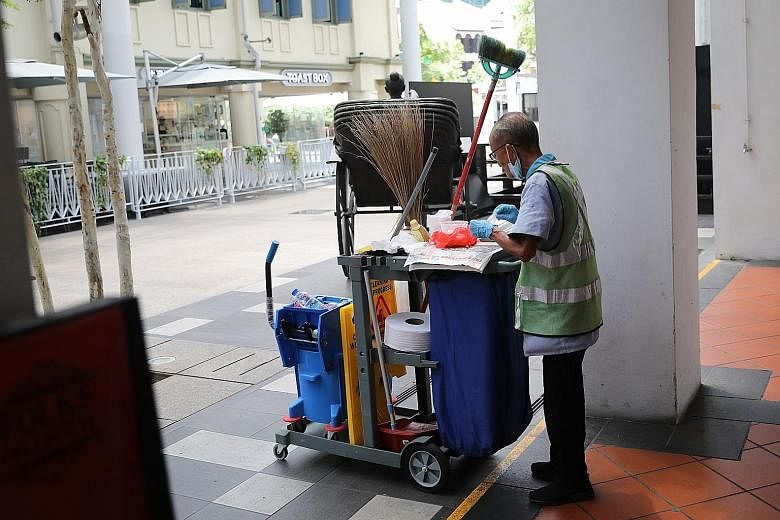Employers should be sensitive when older workers voice concerns about continuing to work outside, and take steps to ensure that they are protected.
Manpower Minister Josephine Teo made the call when asked about the potential conflict between the Government's advice for seniors to stay home and the fact that many older workers are still out earning their keep.
She said at a virtual press conference yesterday that employers should be sympathetic to older workers in essential services who are worried about being outdoors.
Where telecommuting arrangements cannot be worked out, employers should redeploy these workers in roles that require minimal interaction with others, she said.
If that is not possible, then employers must make sure these workers are given "adequate protection", such as masks that all essential workers should have, and keep them updated on the company's latest protocols amid the elevated safe distancing measures.
But the minister also laid out two other possibilities, in case the employer and the concerned worker cannot come to an agreement.
First, the worker can choose to clear his leave and continue to be paid. But once this leave is exhausted, the employer and the worker will have to find new arrangements - a "mutual consensus" which may include a period of no pay.
She said: "I think it is really important for the employers to understand and to attend to the concerns of their workers. Particularly for the seniors - we do want to take good care of them. We want to ensure that they not only feel safe if they have to come to work, but (that they) are actually well protected."
The issue of older workers doing front-line work has come under the spotlight, with a petition lobbying SMRT to stop using them to direct commuters at MRT stations. The reason given in the petition is that these workers are vulnerable to Covid-19.
The week-old online petition on change.org has garnered more than 5,000 signatures, as Singapore continues to see more infected by the coronavirus. As of yesterday, there were 3,252 detected cases. Of these, 10 have died, all aged above 60.
The petition, called Protect Our Senior Citizens Working At All MRT Stations During Covid-19, was started by an Insyirah Zakariah.
She was uncontactable but, in her petition, she wrote: "I want to call attention to a small target group that is part of an essential service that is tasked to continue operating, one of them being the service ambassadors that are employed and managed by SMRT Corp."
"The elderly are known to be more vulnerable to the virus and hence should stay home... Every day, these senior service ambassadors are exposed to hundreds of people during one shift," she added.
Not all who visited the page agreed with that. A Heng Wah Kheng wrote: "I'm not signing because a lot of these folks are very healthy and they enjoy their work. Who are you to tell them not to work?"
A John Tan retorted: "Protecting these front-line staff does not mean sacrificing their pay if SMRT can be flexible enough to have its service ambassadors look after passengers remotely."
He added that older workers could man passenger service counters which are behind a glass screen, "where they can monitor the platforms via CCTV (closed-circuit television) and advise passengers via the public address system".
SMRT chief executive Neo Kian Hong said the firm would discuss options with any staff facing difficulty in their roles, including those with pre-existing medical conditions. "This way, we protect the safety and well-being of our staff and commuters, while our staff can remain meaningfully employed to support our essential services during the circuit breaker phase."
Asked to comment, Dr Sitoh Yih Yiow, who specialises in geriatric medicine, said: "If older persons need to be deployed in crowd control roles, they should be given adequate protection, for example, appropriate masks - certainly not cloth masks - and perhaps even goggles. If it is possible to deploy them in roles where there is less contact (with others), such measures should be taken."
Elsewhere, Aetos, whose auxiliary police and security personnel often interact with the public, said it has taken early measures to protect its vulnerable workers, including those who are older, pregnant and with pre-existing medical conditions. It allows them to work form home "wherever possible".
- Additional reporting by Lim Min Zhang











